Politics
Jenrick and Tugendhat call for Tories to cut leadership contest short | Conservative leadership
Two Tory leadership candidates, Robert Jenrick and Tom Tugendhat, have publicly called for the party to cut short the contest, a move that is opposed by their rival Kemi Badenoch.
Senior Conservatives were reported to be in talks about bringing forward the announcement by a week, according to the Mail, but the party said on Sunday that there were currently no plans to change the date, despite calls from candidates.
The contest is scheduled to run until 2 November. That would mean no Tory leader was in place before the 30 October budget, which the leader of the opposition responds to in parliament. Rishi Sunak, the former prime minister, will have to respond to Rachel Reeves under the current timing. He would then step down as leader three days later.
There is also disquiet that the result of the Tory leadership on Saturday 2 November will be hugely overshadowed by the final days of the US election, which is the following Tuesday.
Jenrick, who is the frontrunner, wrote in an article for the Sun that it was imperative a new Tory leader could respond to Labour’s first budget. “This Labour government seems intent on making things harder for working people at the upcoming budget,” he said.
“I support shortening the contest so the new leader can hold this Labour government to account for their broken promises when the eyes of the nation are watching.”
He told Times Radio he wanted to “be the one at the dispatch box making that argument”.
Tugendhat, the former security minister, who is trailing Jenrick and Badenoch, also told Times Radio he backed a shorter contest.
But Badenoch, who is in a close race with Jenrick, told Times Radio the length of the contest was “fine” and did not need to be changed. James Cleverly, the former home secretary who is the fourth candidate in the contest, is yet to give his view.
after newsletter promotion
In the latest round of voting this month, Jenrick had 33 backers among MPs, followed by Badenoch with 28 and Cleverly and Tugendhat both with 21. According to ConservativeHome, less than half the parliamentary party – 55 of 121 MPs – have openly declared who they support.
The four candidates are taking part in a stream of events during the Conservative party conference, including one-on-one interviews and speeches on stage, as well as numerous receptions. There is no debate planned between the four candidates.
Politics
UK and Germany to sign landmark ‘defence’ treaty

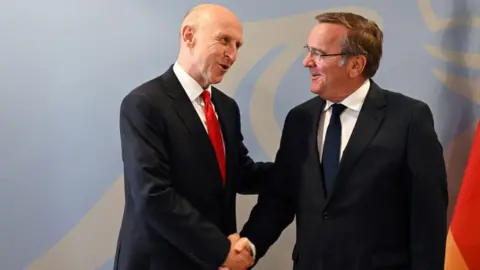 Getty Images
Getty ImagesBritain and Germany will sign what the UK government is calling a “landmark defence agreement” aimed at boosting security, investment and jobs.
Under the agreement, German defence company Rheinmetall will open a new factory in the UK to manufacture barrels for artillery guns – supporting 400 jobs.
Both countries will work together to develop drones and a new long-range missile.
German maritime surveillance aircraft will also periodically fly patrols of the North Atlantic from RAF Lossiemouth in Scotland.
Labour promised to build closer military ties with Germany while in opposition and this is part of a wider push by this government to reset relations with key European allies post Brexit.
The German Ambassador to the UK, Miguel Berger, said the European Commission will have a very strong focus on defence in the next five years, and there is space for the UK to be involved.
“Obviously the question is – what can the role of the British defence industry and of the capacities of the United Kingdom be in this joint endeavour?” he told BBC Radio 4’s Today programme.
The UK already has a defence pact with France – the Lancaster House Treaty signed in 2010 by David Cameron and Nicholas Sarkozy – but this is the first with Germany.
Germany and the UK are the two largest defence spenders in Europe and the biggest European military donors to Ukraine.
Defence Secretary John Healey said it was a “milestone moment”, bringing the two countries’ militaries and defence industries closer.
In reality the two nations already co-operate as members of the Nato alliance.
In a joint venture, they are also building new tanks and armoured vehicles for the British Army, Germany’s Rheinmetall and the UK’s BAE Systems-formed RBSL to manufacture the Boxer armoured fighting vehicle and the latest Challenger 3 tank in Telford, Shropshire.
 PA Media
PA MediaUnder the new Trinity House Agreement, Rheinmetall will build a factory in the UK to produce barrels for artillery guns – something the UK stopped doing more than a decade ago.
The site for the factory has not yet been announced, but the Ministry of Defence (MOD) says it will support more than 400 jobs and use British steel produced by Sheffield Forgemasters.
The steelmaker was recently acquired by the UK Government. The first artillery gun barrels are expected to roll off the production line in 2027.
The Trinity House Agreement also includes a commitment to develop a new long-range missile, which the MOD says will be more precise and can be fired further than any current systems – the UK’s Storm Shadow and Germany’s Taurus. Unlike the UK, Germany has refused to supply Ukraine with its Taurus cruise missile.
The UK and Germany will further co-operate on developing drones that might be able to fly alongside Typhoon jets operated by both countries.
German P8 maritime surveillance aircraft will periodically operate out of RAF Lossiemouth in Scotland to help patrol the North Atlantic. Other Nato allies have been doing the same for a number of years.
There is also a promise to bolster the defence of Nato’s eastern flank; both the UK and Germany have already sent hundreds of troops to the Baltic states as part of Nato’s enhanced defence plans following Russia’s invasion of Ukraine.
Germany’s Defence Minister Boris Pistorius said the agreement would strengthen Europe and Nato.
“We must not take security in Europe for granted,” he said, adding the projects being undertaken would be open to other partners.
Politics
Government to revive police firearms review
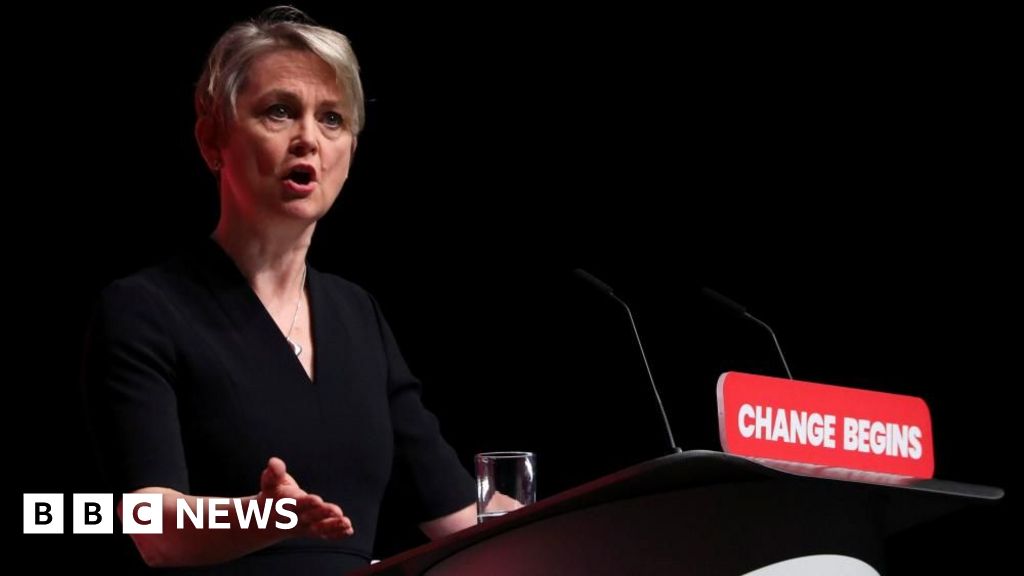
The government will revive a review into how police officers who take fatal shots in the line of duty are held to account following the shooting of Chris Kaba, the prime minister said.
The probe was initially launched by the previous government, but will now be completed by Home Secretary Yvette Cooper.
Sir Keir Starmer said it was important that the public have confidence in the police and that police have confidence in the government.
It comes days after police officer Martyn Blake was cleared of the murder of Mr Kaba.
“We are going to pick [the probe] up and complete that accountability review because it is important that the public have confidence in the police including of course the armed police,” Sir Keir said.
“It’s also important that the police know that we have confidence in them doing a very difficult job, so we will pick that up.”
He added that more details would be available later on Wednesday when Ms Cooper makes a statement in the House of Commons.
Under the current law, every armed police officer is personally responsible for their actions. Officers cannot use more force than is necessary to neutralise a threat.
A superior officer cannot tell a police officer to pull the trigger – nor can there be a pre-emptive tactical decision to shoot a suspect whatever the circumstances.
On Monday, police officer Mr Blake was cleared of murdering Chris Kaba, who he shot in the head during a police vehicle stop in south London two years ago.
It has since been revealed that Mr Kaba had shot a man in a nightclub days before his own death.
Reacting to the verdict Metropolitan Police Commissioner Sir Mark Rowley said no police officer was above the law but said the force had been clear “the system holding police to account is broken”.
“I worry about the lack of support officers face for doing their best, but most of all, I worry for the public,” he said.
“The more we crush the spirit of good officers, the less they can fight crime – that risks London becoming less safe.”
Abimbola Johnson, a barrister on a scrutiny board set up by the National Police Chiefs Council in the summer to boost confidence among minority ethnic people, warned against using the Kaba case to push for legislative change.
“It is already extremely rare for us to see police officers being prosecuted under the criminal justice system for action they have conducted whilst in the line of duty,” she told BBC Radio 4’s Today programme.
She added: “This is not a typical case, therefore, using this as a reason to push for legislative change, it doesn’t make sense, because this isn’t normally what would happen throughout the process.”
Politics
Labour volunteers in US helping Harris ‘in spare time’
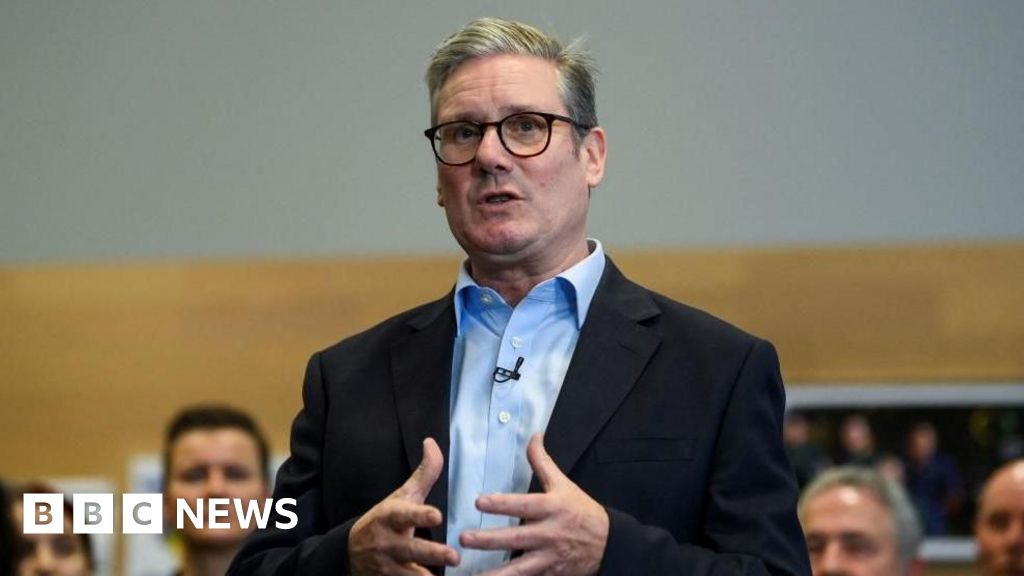
Prime Minister Sir Keir Starmer has sought to play down the significance of alleged interference by the Labour Party in the American presidential election.
The Trump Campaign has filed a complaint with the Federal Election Commission in Washington seeking an immediate investigation – after the Head of Operations for the Labour Party, Sofia Patel, posted on social media that she had “ten spots available” for anyone willing to travel to North Carolina to campaign for Kamala Harris, adding “we will sort your housing”.
She said she had around 100 current and former party staff heading to America before polling day.
The post, on LinkedIn, has since been deleted.
Foreign nationals are permitted to serve as volunteers on campaigns in the US as long as they are not compensated, according to Federal Election Commission rules.
The complaint from the Trump Campaign is both pointed and theatrical.
“When representatives of the British government previously sought to go door-to-door in America, it did not end well for them,” it read.
That is a matter-of-fact reference to US independence around 250 years ago.
On matters more contemporary it requests “an immediate investigation” into what it calls “blatant foreign interference”.
Speaking to reporters while flying to the Commonwealth Heads of Government Summit in Samoa in the south Pacific, the prime minister said: “The Labour Party has volunteers, [they] have gone over pretty much every election.
“They’re doing it in their spare time. They’re doing it as volunteers. They’re staying I think with other volunteers over there.”
The Trump Campaign letter to the Federal Election Commission also says: “Morgan McSweeney, the Prime Minister’s chief of staff, and Matthew Doyle, director of communications, attended the (Democratic) convention in Chicago and met with Ms Harris’ campaign team.
“Deborah Mattinson, Sir Keir’s director of strategy, also went to Washington in September to brief Ms Harris’ presidential campaign on Labour’s election-winning approach.”
Ms Mattinson no longer works for the Labour Party.
Party sources say Mr Doyle and Mr McSweeney went to the Democratic Convention in their own time, and that the Democratic Party didn’t pay their travel and accommodation costs.
It isn’t clear who did.
Asked if the row risked jeopardising his relationship with Donald Trump, the prime minister said “no” – pointing to the dinner the two men had together at Trump Tower in New York last month.
“We established a good relationship. We’re grateful for him for making the time… for that dinner,” Sir Keir said.
“We had a good, constructive discussion and, of course as prime minister of the United Kingdom I will work with whoever the American people return as their President in their elections, which are very close now.”
Sir Keir has never met the Vice-President Harris, Trump’s Democratic rival.
But he has met President Biden several times since becoming prime minister in July.
Politics
Reeves confirms Budget spending deals struck with all departments

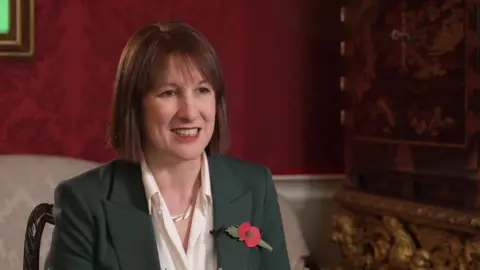 BBC
BBCChancellor Rachel Reeves says she has now reached spending settlements with all government departments ahead of her much-anticipated Budget on 30 October.
It comes after reports of Treasury rows with multiple departments over the expected scale of spending cuts.
Reeves told BBC Radio 5’s Matt Chorley she had struck deals with all her cabinet colleagues – and in line with tradition, popped all balloons put up in the Treasury to represent each department’s funding agreement.
While sympathising with “the mess” her colleagues had inherited, Reeves insisted departments needed to find savings to balance the budget.
In recent Budgets, chancellors have adopted the tradition of hanging balloons in the office of the Chief Secretary to the Treasury to represent spending deals that must be negotiated with government departments.
As settlements are reached, the balloons are popped.
In the exclusive interview, Reeves said: “There are no balloons left in the Chief Secretary’s office – the balloons have been burst.”
In the run-up to the Budget there have been growing reports of unease in the Cabinet over the spending cuts needed to meet the Treasury’s target of finding £40bn of savings.
Sky News reported that the Treasury missed its initial 16 October deadline to finalise all major Budget measures for submission to spending watchdog the Office of Budget Responsibility ahead of the Budget.
Deputy Prime Minister Angela Rayner who runs the Ministry of Housing, Communities and Local Government, as well as Justice Secretary Shabana Mahmood and Transport Secretary Louise Haigh have all been reported as writing to Sir Keir Starmer to complain about the scale of cuts their departments were facing.
Haigh has since told the BBC she did not write a letter, but had been having Budget negotiations with the Treasury “in the normal way”.
Addressing reports colleagues had gone over her head to take their concerns about budget cuts directly to the prime minister, Reeves said, “I wouldn’t believe everything you read” in the media.
But she went on to say it was “perfectly reasonable that Cabinet colleagues set out their case – both to me as chancellor and to the prime minister, about the scale of the challenges that they find in their departments”.
“I’m very sympathetic towards the mess that my colleagues have inherited”, Reeves said.
“But any additional money, in the end, it has to be paid for either by taking money from other departments or raising taxes.”
Taxes on ‘working people’
The Labour manifesto promised not to raise income tax rates, national insurance or VAT to protect “working people”.
Labour also campaigned on a pledge not to “return to austerity” – the programme of deep spending cuts and tax hikes aimed at reducing the UK’s budget deficit pursued by the 2010 Conservative-Liberal Democrat coalition.
“All of those things mean that we do need to find additional money,” Reeves said.
Reeves admitted this meant she was considering tweaks to “other taxes to ensure the sums add up”.
“We were clear during the election campaign, you can’t undo 14 years of damage in one Budget or in just a few months,” she said.
“It is going to take time to rebuild our public services to ensure that working people are better off and to fix the foundations of our economy and our society as well.”
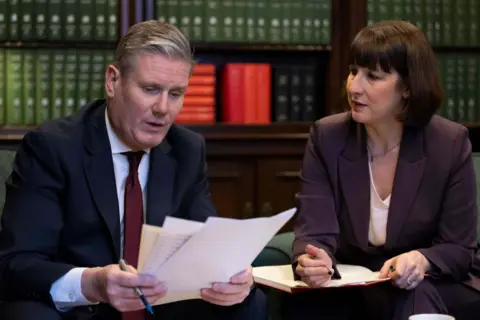 Getty Images
Getty ImagesAs she looks to balance the first Labour Budget in 14 years, Reeves admitted she speaks to several major political figures.
“I speak to Gordon regularly – I also speak to Tony Blair regularly,” she said.
She also maintains a “good relationship” with her predecessor Jeremy Hunt, regularly messaging the Conservative shadow chancellor.
“I may not be particularly impressed with the state of the public finances that he left me, but I do recognise that after Kwasi Kwarteng, he had a tough job to do as well,” she said.
The one person she wishes she could “pick up the phone to now” is Alistair Darling, the last Labour chancellor to deliver a Budget – who died last year aged 70.
Lord Darling served in cabinet for 13 years under both Blair and Brown, and was best known as the chancellor who steered the UK through the 2008 financial crisis.
“I hope that he would be proud of what I’m doing as the next Labour chancellor after him,” she said.
Reeves spoke about her pride at being the first female chancellor in the role’s 800-year history.
Becoming chancellor was “beyond what a girl like me, from the ordinary background that I came from, could have ever dreamed of,” Reeves said.
Now in her “dream job”, Reeves said, “one of the wonderful things in the first few months of doing this job is to meet female finance ministers from around the world” – such as US Secretary of the Treasury Janet Yellen and Chrystia Freeland, the Canadian finance minister.
“I take a lot of inspiration from those amazing women and so many others,” Reeves said.
Politics
Trump accuses UK’s Labour Party of ‘foreign interference’
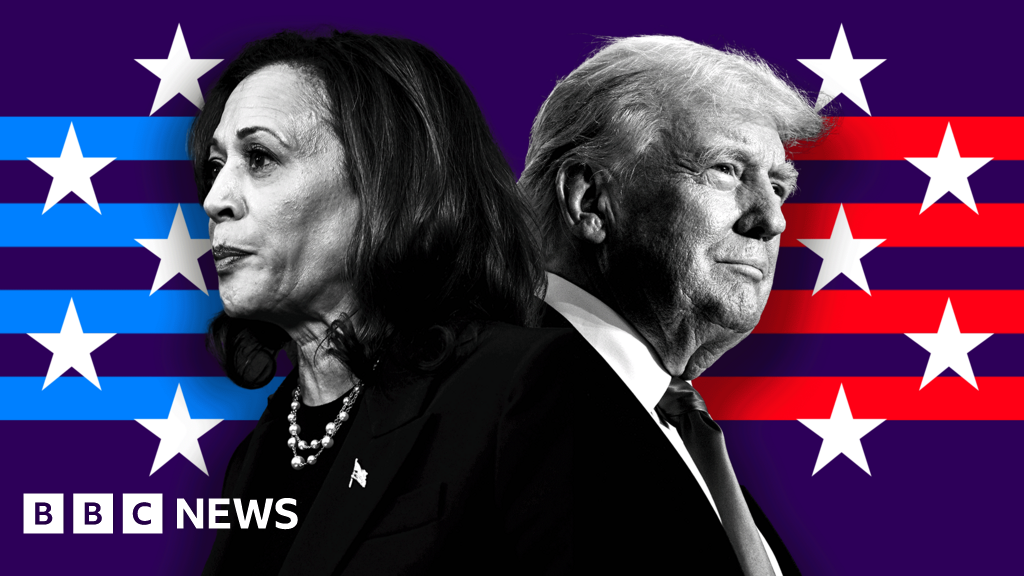
Donald Trump’s campaign has filed a Federal Election Commission (FEC) complaint against the UK’s Labour Party, accusing it of “blatant foreign interference” in the US election in aid of the Harris-Walz campaign.
The complaint cites media reports about contact between Labour and the Harris campaign, as well as apparent volunteering efforts, arguing that this amounts to illegal “contributions”.
The BBC understands that Labour activists campaigning in the US presidential election are doing so in a personal capacity.
The Labour Party has not issued an official response.
Specifically, the complaint cites newspaper reporting that Labour-linked individuals have travelled to the US to campaign for Harris.
That reporting, the complaint alleges, creates a “reasonable inference that the Labour Party has made, and the Harris campaign has accepted, illegal foreign national contributions.”
The letter refers to Washington Post reporting that communications were exchanged between the parties and that senior officials have met in private.
Additionally, the complaint cites a social media post on LinkedIn in which a Labour staff member said that “nearly 100” current and former party members will be headed to battleground states in the US.
The post, from Labour Party head of operations Sofia Patel, added that 10 “spots” are available and that “we will sort your housing”.
It appears to have since been deleted.
The complaint makes comparisons to an international programme in 2016 in which the Australian Labor Party, or ALP, sent delegates to help with Bernie Sanders’ campaign.
In that instance, however, the ALP paid for flights and daily stipends. The party and the campaign were each handed down civil penalties of $14,500.
Labour activists’ trips were not organised or funded by the party, it is understood from party officials.
Foreign nationals are permitted to serve as campaign volunteers as long as they are not compensated, according to FEC rules.
It is considered normal for party officials from the UK to be in contact with counterparts in the US.
It also has taken place previously between the UK’s Conservative Party and US Republicans.
The BBC has contacted the Harris-Walz campaign for comment.
Politics
Starmer warns Russia attacks in Ukraine risk global food security
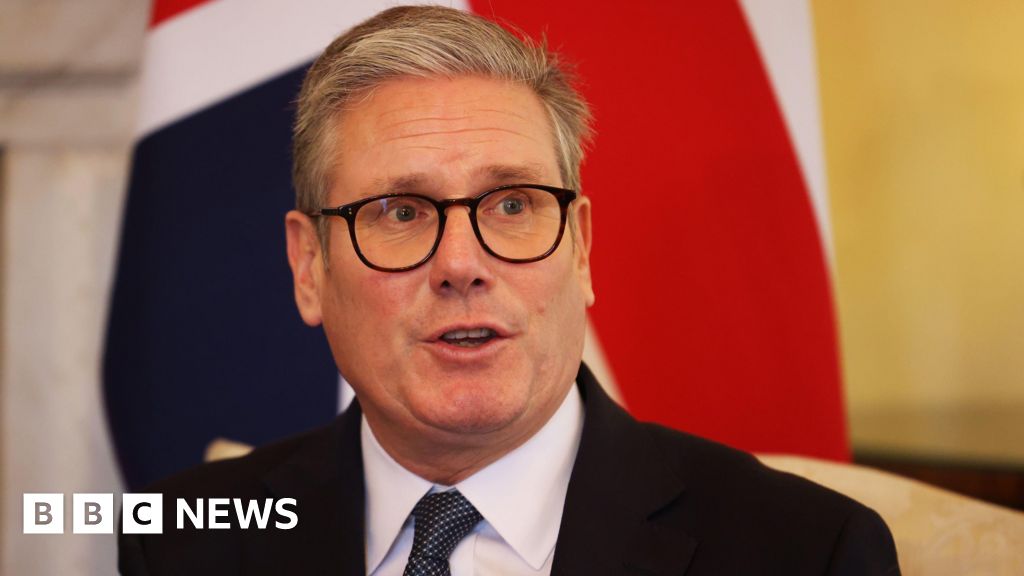
Prime Minister Sir Keir Starmer has warned that Russia is stepping up attacks on Ukrainian ports in the Black Sea – delaying the export of agricultural produce, including aid intended for Palestinians caught up in the conflict with Israel.
During several days of strikes in early October, Russian weapons hit at least four cargo ships, including one reportedly carrying 6,000 tonnes of corn.
Sir Keir said that Russia’s President Vladimir Putin was willing “to gamble on global food security in his attempts to force Ukraine into submission”.
The prime minister’s remarks came as he travels to the Pacific Island of Samoa for a meeting of Commonwealth heads of government.
During several days of strikes, Russian missile strikes on the Odesa region hit a Panamanian-registered ship and a Palau-flagged cargo ship were also attacked, killing one person on-board.
Several people in the southern city of Zaporizhzhia were injured as 29 homes were destroyed and pictures released by regional officials show a giant crater in the mud, with bricks and wood strewn all around.
A wave of strikes on Ukraine’s Black Sea ports coincided with a European tour by President Volodymyr Zelensky – who visited leaders in London, Paris, Rome and Berlin.
But Sir Keir pointed out the increasing number of Russian attacks coincided with harvest season.
Despite the war, Ukraine is still a significant supplier of agricultural goods.
But British intelligence suggests a growth in what officials call Russian “risk appetite” when attacking Ukrainian ports – with grain ships becoming what is described as “collateral damage” in Russia’s campaign.
Sir Keir said the “indiscriminate attacks” were “harming millions of vulnerable people across Africa, Asia and the Middle East”.
According to Ukrainian figures, more than 20 civilian ships have now been damaged in Russian attacks since the start of the war in 2022.
Grain silos and other port infrastructure have been badly damaged too.
However, Ukraine has succeeded in creating a maritime corridor to ensure the safety of grain exports, after Moscow pulled out of a Black Sea grain deal last year.
Some 962,000 tonnes of grain were exported in the first ten days of October, according to the agriculture ministry in Kyiv – double the volume shipped in the same period last year.
Speaking to journalists travelling with him to Samoa, Sir Keir said Russia’s recent recruitment of troops from North Korea was “an embarrassing and desperate act.
On Tuesday, the British government announced that it would give Ukraine an extra £2.26bn using the profits from Russian assets held in Europe.
The one-off payment is an addition to £3bn already pledged by the government to fund Ukraine’s war effort.
So far, the UK has given more than £12bn in military aid and has promised to match that level of support in the future.
Announcing the funding, Chancellor Rachel Reeves said it showed the UK’s support for Ukraine was “unwavering and will remain for as long as it takes”.
-

 Science & Environment1 month ago
Science & Environment1 month agoHyperelastic gel is one of the stretchiest materials known to science
-

 Technology4 weeks ago
Technology4 weeks agoIs sharing your smartphone PIN part of a healthy relationship?
-

 Science & Environment1 month ago
Science & Environment1 month ago‘Running of the bulls’ festival crowds move like charged particles
-

 Science & Environment1 month ago
Science & Environment1 month agoHow to unsnarl a tangle of threads, according to physics
-

 Science & Environment1 month ago
Science & Environment1 month agoMaxwell’s demon charges quantum batteries inside of a quantum computer
-

 Technology1 month ago
Technology1 month agoWould-be reality TV contestants ‘not looking real’
-

 Science & Environment4 weeks ago
Science & Environment4 weeks agoX-rays reveal half-billion-year-old insect ancestor
-

 Science & Environment1 month ago
Science & Environment1 month agoSunlight-trapping device can generate temperatures over 1000°C
-

 Science & Environment1 month ago
Science & Environment1 month agoLiquid crystals could improve quantum communication devices
-

 Science & Environment1 month ago
Science & Environment1 month agoQuantum ‘supersolid’ matter stirred using magnets
-

 Womens Workouts4 weeks ago
Womens Workouts4 weeks ago3 Day Full Body Women’s Dumbbell Only Workout
-

 Technology3 weeks ago
Technology3 weeks agoUkraine is using AI to manage the removal of Russian landmines
-

 TV3 weeks ago
TV3 weeks agoসারাদেশে দিনব্যাপী বৃষ্টির পূর্বাভাস; সমুদ্রবন্দরে ৩ নম্বর সংকেত | Weather Today | Jamuna TV
-

 Science & Environment1 month ago
Science & Environment1 month agoLaser helps turn an electron into a coil of mass and charge
-

 Science & Environment1 month ago
Science & Environment1 month agoWhy this is a golden age for life to thrive across the universe
-

 Science & Environment1 month ago
Science & Environment1 month agoA new kind of experiment at the Large Hadron Collider could unravel quantum reality
-

 Science & Environment1 month ago
Science & Environment1 month agoQuantum forces used to automatically assemble tiny device
-

 News3 weeks ago
News3 weeks agoMassive blasts in Beirut after renewed Israeli air strikes
-

 News2 weeks ago
News2 weeks agoNavigating the News Void: Opportunities for Revitalization
-

 Football3 weeks ago
Football3 weeks agoRangers & Celtic ready for first SWPL derby showdown
-

 Business3 weeks ago
Business3 weeks agoWhen to tip and when not to tip
-

 Science & Environment1 month ago
Science & Environment1 month agoA slight curve helps rocks make the biggest splash
-

 Science & Environment1 month ago
Science & Environment1 month agoNerve fibres in the brain could generate quantum entanglement
-

 Science & Environment1 month ago
Science & Environment1 month agoHow to wrap your mind around the real multiverse
-

 Science & Environment1 month ago
Science & Environment1 month agoITER: Is the world’s biggest fusion experiment dead after new delay to 2035?
-

 Science & Environment1 month ago
Science & Environment1 month agoNuclear fusion experiment overcomes two key operating hurdles
-

 News1 month ago
News1 month ago▶️ Hamas in the West Bank: Rising Support and Deadly Attacks You Might Not Know About
-

 MMA3 weeks ago
MMA3 weeks agoJulianna Peña trashes Raquel Pennington’s behavior as champ
-
Business3 weeks ago
DoJ accuses Donald Trump of ‘private criminal effort’ to overturn 2020 election
-

 Technology3 weeks ago
Technology3 weeks agoSamsung Passkeys will work with Samsung’s smart home devices
-

 News3 weeks ago
News3 weeks ago▶ Hamas Spent $1B on Tunnels Instead of Investing in a Future for Gaza’s People
-

 News1 month ago
News1 month ago▶️ Media Bias: How They Spin Attack on Hezbollah and Ignore the Reality
-

 Science & Environment1 month ago
Science & Environment1 month agoTime travel sci-fi novel is a rip-roaringly good thought experiment
-

 Technology3 weeks ago
Technology3 weeks agoMicrophone made of atom-thick graphene could be used in smartphones
-

 MMA2 weeks ago
MMA2 weeks ago‘Uncrowned queen’ Kayla Harrison tastes blood, wants UFC title run
-

 MMA3 weeks ago
MMA3 weeks agoPereira vs. Rountree prediction: Champ chases legend status
-

 Sport3 weeks ago
Sport3 weeks agoBoxing: World champion Nick Ball set for Liverpool homecoming against Ronny Rios
-

 Sport3 weeks ago
Sport3 weeks agoWales fall to second loss of WXV against Italy
-

 Science & Environment1 month ago
Science & Environment1 month agoPhysicists have worked out how to melt any material
-
News1 month ago
the pick of new debut fiction
-

 News1 month ago
News1 month agoOur millionaire neighbour blocks us from using public footpath & screams at us in street.. it’s like living in a WARZONE – WordupNews
-

 Technology4 weeks ago
Technology4 weeks agoWhy Machines Learn: A clever primer makes sense of what makes AI possible
-

 Technology1 month ago
Technology1 month agoMeta has a major opportunity to win the AI hardware race
-

 Technology3 weeks ago
Technology3 weeks agoMusk faces SEC questions over X takeover
-

 Sport3 weeks ago
Sport3 weeks agoWorld’s sexiest referee Claudia Romani shows off incredible figure in animal print bikini on South Beach
-

 Technology3 weeks ago
Technology3 weeks agoThe best budget robot vacuums for 2024
-

 Sport3 weeks ago
Sport3 weeks agoMan City ask for Premier League season to be DELAYED as Pep Guardiola escalates fixture pile-up row
-

 MMA3 weeks ago
MMA3 weeks agoDana White’s Contender Series 74 recap, analysis, winner grades
-

 Technology3 weeks ago
Technology3 weeks agoThis AI video generator can melt, crush, blow up, or turn anything into cake
-

 News3 weeks ago
News3 weeks agoFamily plans to honor hurricane victim using logs from fallen tree that killed him
-

 MMA3 weeks ago
MMA3 weeks agoPereira vs. Rountree preview show live stream
-

 Sport3 weeks ago
Sport3 weeks agoCoco Gauff stages superb comeback to reach China Open final
-

 News3 weeks ago
News3 weeks agoGerman Car Company Declares Bankruptcy – 200 Employees Lose Their Jobs
-

 News3 weeks ago
News3 weeks ago‘Blacks for Trump’ and Pennsylvania progressives play for undecided voters
-

 Technology3 weeks ago
Technology3 weeks agoTexas is suing TikTok for allegedly violating its new child privacy law
-

 Sport3 weeks ago
Sport3 weeks agoSturm Graz: How Austrians ended Red Bull’s title dominance
-

 Money3 weeks ago
Money3 weeks agoWetherspoons issues update on closures – see the full list of five still at risk and 26 gone for good
-

 News2 weeks ago
News2 weeks agoHeavy strikes shake Beirut as Israel expands Lebanon campaign
-

 TV2 weeks ago
TV2 weeks agoLove Island star sparks feud rumours as one Islander is missing from glam girls’ night
-
Business3 weeks ago
Bank of England warns of ‘future stress’ from hedge fund bets against US Treasuries
-

 Business3 weeks ago
Business3 weeks agoChancellor Rachel Reeves says she needs to raise £20bn. How might she do it?
-

 MMA3 weeks ago
MMA3 weeks agoAlex Pereira faces ‘trap game’ vs. Khalil Rountree
-

 News3 weeks ago
News3 weeks agoHeartbreaking end to search as body of influencer, 27, found after yacht party shipwreck on ‘Devil’s Throat’ coastline
-
Business3 weeks ago
Sterling slides after Bailey says BoE could be ‘a bit more aggressive’ on rates
-

 MMA3 weeks ago
MMA3 weeks agoUFC 307 preview show: Will Alex Pereira’s wild ride continue, or does Khalil Rountree shock the world?
-

 Science & Environment1 month ago
Science & Environment1 month agoPhysicists are grappling with their own reproducibility crisis
-

 Football3 weeks ago
Football3 weeks agoSimo Valakari: New St Johnstone boss says Scotland special in his heart
-

 TV3 weeks ago
TV3 weeks agoPhillip Schofield accidentally sets his camp on FIRE after using emergency radio to Channel 5 crew
-

 News3 weeks ago
News3 weeks agoWoman who died of cancer ‘was misdiagnosed on phone call with GP’
-

 Technology3 weeks ago
Technology3 weeks agoThe best shows on Max (formerly HBO Max) right now
-

 Science & Environment3 weeks ago
Science & Environment3 weeks agoMarkets watch for dangers of further escalation
-

 Technology3 weeks ago
Technology3 weeks agoJ.B. Hunt and UP.Labs launch venture lab to build logistics startups
-

 Sport3 weeks ago
Sport3 weeks agoChina Open: Carlos Alcaraz recovers to beat Jannik Sinner in dramatic final
-

 TV3 weeks ago
TV3 weeks agoMaayavi (මායාවී) | Episode 23 | 02nd October 2024 | Sirasa TV
-

 Technology3 weeks ago
Technology3 weeks agoPopular financial newsletter claims Roblox enables child sexual abuse
-

 News3 weeks ago
News3 weeks agoHull KR 10-8 Warrington Wolves – Robins reach first Super League Grand Final
-

 Technology3 weeks ago
Technology3 weeks agoOpenAI secured more billions, but there’s still capital left for other startups
-
Business3 weeks ago
Head of UK Competition Appeal Tribunal to step down after rebuke for serious misconduct
-
Business3 weeks ago
The search for Japan’s ‘lost’ art
-

 Sport3 weeks ago
Sport3 weeks agoAaron Ramsdale: Southampton goalkeeper left Arsenal for more game time
-

 MMA3 weeks ago
MMA3 weeks agoKetlen Vieira vs. Kayla Harrison pick, start time, odds: UFC 307
-

 News3 weeks ago
News3 weeks agoBalancing India and China Is the Challenge for Sri Lanka’s Dissanayake
-

 Entertainment3 weeks ago
Entertainment3 weeks ago“Golden owl” treasure hunt launched decades ago may finally have been solved
-

 Science & Environment1 month ago
Science & Environment1 month agoA tale of two mysteries: ghostly neutrinos and the proton decay puzzle
-
Business4 weeks ago
Eurosceptic Andrej Babiš eyes return to power in Czech Republic
-

 Sport1 month ago
Sport1 month agoJoshua vs Dubois: Chris Eubank Jr says ‘AJ’ could beat Tyson Fury and any other heavyweight in the world
-
News1 month ago
The Project Censored Newsletter – May 2024
-

 Technology4 weeks ago
Technology4 weeks agoArtificial flavours released by cooking aim to improve lab-grown meat
-

 Technology3 weeks ago
Technology3 weeks agoUniversity examiners fail to spot ChatGPT answers in real-world test
-

 Technology3 weeks ago
Technology3 weeks agoEpic Games CEO Tim Sweeney renews blast at ‘gatekeeper’ platform owners
-

 News3 weeks ago
News3 weeks agoLiverpool secure win over Bologna on a night that shows this format might work
-

 Technology3 weeks ago
Technology3 weeks agoGmail gets redesigned summary cards with more data & features
-

 Technology3 weeks ago
Technology3 weeks agoMicrosoft just dropped Drasi, and it could change how we handle big data
-

 MMA3 weeks ago
MMA3 weeks agoKayla Harrison gets involved in nasty war of words with Julianna Pena and Ketlen Vieira
-

 Technology3 weeks ago
Technology3 weeks agoApple iPhone 16 Plus vs Samsung Galaxy S24+
-

 Health & fitness3 weeks ago
Health & fitness3 weeks agoNHS surgeon who couldn’t find his scalpel cut patient’s chest open with the penknife he used to slice up his lunch
-

 Technology3 weeks ago
Technology3 weeks agoHow to disable Google Assistant on your Pixel Watch 3
-

 Business3 weeks ago
Business3 weeks agoStark difference in UK and Ireland’s budgets
-

 Money3 weeks ago
Money3 weeks agoPub selling Britain’s ‘CHEAPEST’ pints for just £2.60 – but you’ll have to follow super-strict rules to get in
-
Business3 weeks ago
Can liberals be trusted with liberalism?


You must be logged in to post a comment Login